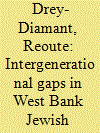| Srl | Item |
| 1 |
ID:
180066


|
|
|
|
|
| Summary/Abstract |
This article examined the differences between the political attitudes of two generations of religious Zionists settlers in the West Bank. Theoretical approaches on intergenerational socialization were reviewed, predicting trends of continuity vis-à-vis change in intergenerational attitudes. Also, previous studies of the religious Zionist sector subgroups, the settlements, and their residents were reviewed. The study was conducted with a quantitative method, while the research tool was an online research questionnaire. The study findings verify the research hypothesis regarding the intergenerational differences in political attitudes, as most issues that were examined found that the younger generation holds more hawkish attitudes in comparison to their parents. Finally, the young Torani were emphasized in the research as the secondary group of settlers who, in most cases, hold the most extreme political attitudes.
|
|
|
|
|
|
|
|
|
|
|
|
|
|
|
|
| 2 |
ID:
137622


|
|
|
|
|
| Summary/Abstract |
This article portrays the theocratization of the Israeli military. At the center of this process stands the national-religious sector, which has significantly upgraded its presence in the ranks since the late 1970s. It is argued that four integrated and cumulative processes gradually generated this shift toward the theocratization of the Israeli military: (1) the crafting of institutional arrangements that enable the service of religious soldiers, thereby (2) creating a critical mass of religious soldiers in many combat units, consequently (3) restricting the military command’s intraorganizational autonomy vis-à-vis the religious sector, and paving the road to (4) restricting the Israel Defense Forces autonomy in deploying forces in politically disputable missions.
|
|
|
|
|
|
|
|
|
|
|
|
|
|
|
|